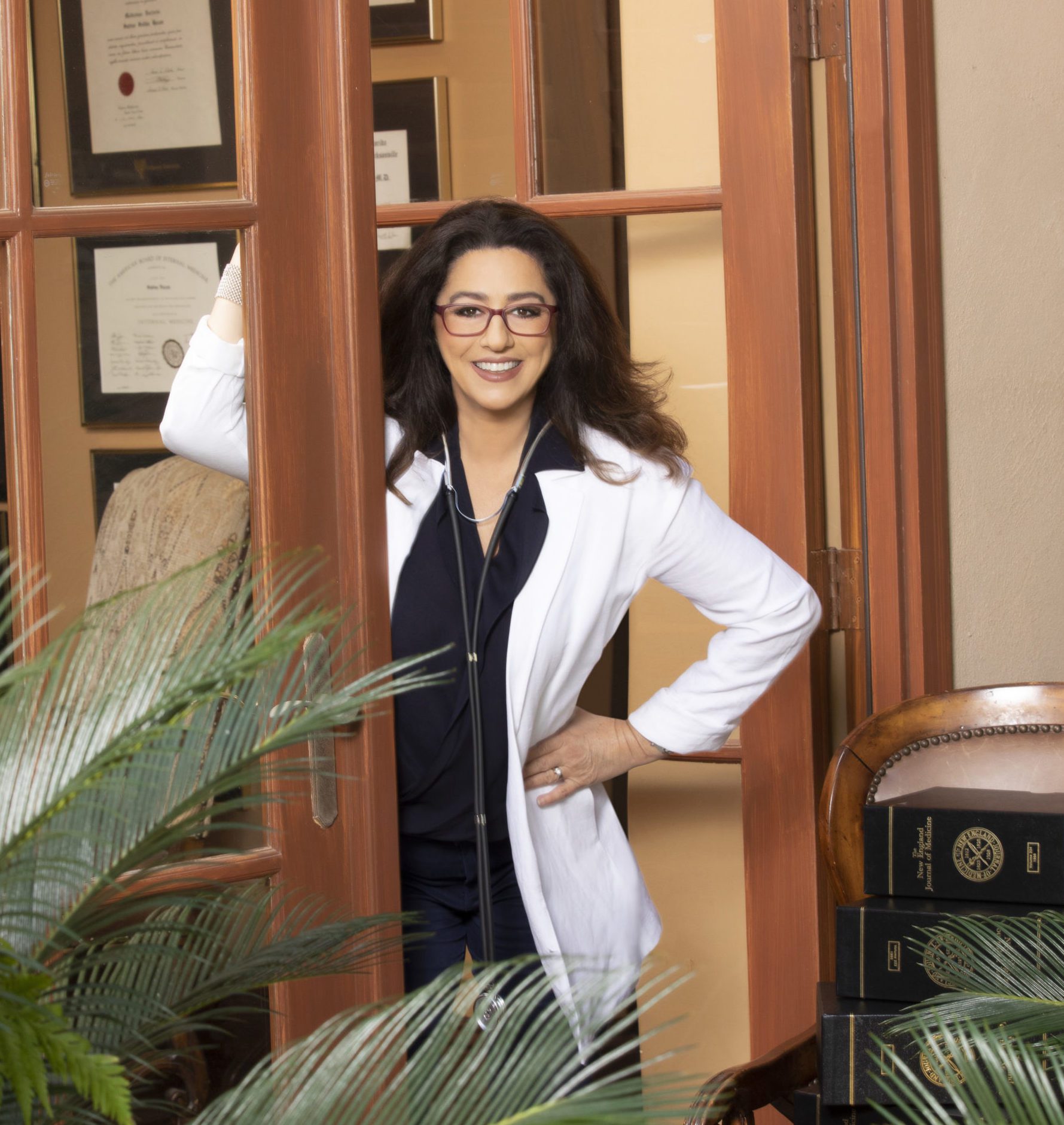
No Roadblocks, Just Challenges
Having decided to pursue a career in medicine in order to “understand life and death and where do we go after we die, if we go somewhere,” Dr. Sabine Hazan, a specialist in gastroenterology, internal medicine, and hepatology, and founder & CEO of the Malibu Specialty Center and Ventura Clinical Trials, explored numerous medicine fields, from Cardiology to Neurology, before settling into the GI Medicine path.
That is when people started throwing hurdles into her way; reasons such as possible future pregnancies or potentially becoming the first woman GI fellow at the University of Florida. With the “Are you telling me I can’t do this? Well, watch me” motto on her radar, Dr. Hazan graduated with the Dean’s Research Award from the University of Florida after successfully becoming a mother. “I ended up delivering my baby on a Friday by C-section, and I was back at work on a Tuesday.” Not only that, she’s still happily married to her cardiologist husband after 27 years, even though “most doctors get divorced right away.”
“Mothers to Children, Mothers to Patients”
The battling spirit exhibited by Dr. Hazan describes the approach of thousands of female doctors who have stepped up as genuine leaders during the COVID-19 pandemic. “We look at the frontline of women doctors that are treating COVID-19 patients right now, and it’s incredible. They’ve all stepped in the leadership as women physicians to take on this virus and, and treated and doing clinical trials on research.” Although the pandemic left both physicians and patients scraping for energy and the will to keep battling the virus, Dr. Hazan and her colleagues saw a way out of this state of events by forming a tightly knitted group, where members dashed to safeguard each other’s backs throughout this crisis.
For women, Dr. Hazan sees patient care as a maternal responsibility. “We are mothers to our children, but also mothers to our patients a little bit what we feel for the patient. We listened to them. There was a survey that was done on women in medicine and, and women actually are better doctors than men are because they listen better.”
Exploring the World of the Microbiome
Following the “always things to discover” mindset, Dr. Hazan managed to expand our knowledge of the microbiome, the “genetic material of all the microbes that live on and inside the human body.” With a specific focus on the Clostridium difficile, a bacteria that we can catch through antibiotics, Dr. Hazan’s research on ways to alleviate diseases such as Alzheimer’s, autism, Crohn’s disease, Parkinson’s, etc. by repairing the microbiome. From her medical experience, she observed how gastrointestinal issues frequently accompany these diseases. As such, Dr. Hazan’s hypothesis states that an amelioration of the microbiome plays a fundamental role in alleviating disease symptoms.
What is the basis for Dr. Hazan’s approach? Aside from clinical trials and enormous amounts of data, Dr. Hazan discovered that fixing the microbiome requires a personalized approach from patient to patient. “Too often, the one-pill-fits-all is just wrong. We’re all different. We all have different fingerprints, different microbiomes. How can we possibly be similar and require the same treatment, the same food, the same pill? There’s a reason why Mediterranean people eat Mediterranean food, and Mexican people eat Mexican food, and Japanese eat Japanese food.”
Repairing the Microbiome through Familial Fecal Transplant
Keeping this observation in mind at all times, Dr. Hazan descends into the depths of the microbiome to understand the nature of the issue and ascertain whether the problem lies in poor diet or somewhere else. “We go super deep to understand the depth of the microbiome, and that’s what we’ve done with every patient.” By using approaches such as familial fecal transplant, Dr. Hazan is confident that medicine will find a way to ameliorate severe conditions such as autism in the future.
Although in its infancy, Dr. Hazan’s hypothesis is showing clear signs of future success. “When I started this path, I told all my patients, ‘I don’t have any answers. It’s all a hypothesis, but we have to start somewhere.’ Research starts with the idea that a familial fecal transplant might be an answer. And then you continue with another idea and another idea, and that’s how we achieve success.”
“There Are Always Things to Discover”
Although still at the surface of the microbiome ocean, Dr. Sabine Hazan sees herself as a pioneer in this field, a pioneer for women who want to expand the field of gastroenterology. However, this privilege always goes hand-in-hand with strenuous work, and Dr. Hazan feels ready to rise to the challenge. “For me, it’s all about being a leader to guide other physicians to practice the art of medicine. We should never be stopped to ask questions. We should always ask questions, and we should always keep the train moving. Once you stop advancing science you stop innovations. There is always something new to discover.”
Here at Top Doctor Magazine, we stand by Dr. Hazan’s diligent approach to discovering the mysterious world of the microbiome. If you would like to expand your knowledge on this subject, make sure that you check out the following website. Furthermore, if you would like to assist Dr. Hazan in her mission, you can always contribute with donations at www.microbiomeresearchfoundation.com.





0 Comments